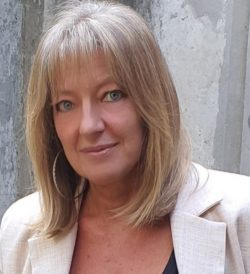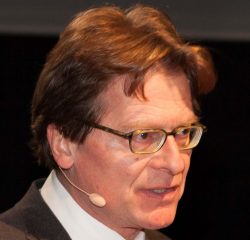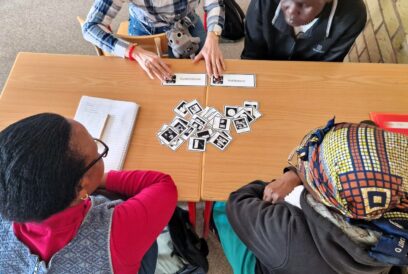

How can adult education not only help people understand the modern world but also empower them to participate in shaping it? Illustration by Carla Ladau
Democracy has been proven fragile – what can adult education do to make it stronger?
Published:How can adult education not only help people understand the modern world but also empower them to participate in shaping it? Illustration by Carla Ladau
Experts and researchers call for adult education to return to its roots and reinvent political education.
In political debate, the art of diplomacy seems to have gone out of fashion.
Populist parties have gained support across Europe, and strong opinions are controlling the airspace more often than carefully studied facts.
While people in Belarus are protesting against an authoritarian regime and pushing for a democratic society, governments in Hungary and Poland are turning away from democracy.
After losing the presidential election in the United States, Donald Trump refused to admit his loss and claimed fraud without providing evidence. Millions of people believed him.
It certainly looks like trust in democratic decision-making, institutions and core values like equality and tolerance are in decline.
According to the report of International Institute for Democracy and Electoral Assistance – a network committed to support democratic progress globally – this is exactly what is going on:
The value, viability and future of democracy are more contested now than ever before in modern history.
While the past four decades have seen a remarkable expansion of democracy throughout all regions of the world, recent years have been marked by declines in the fabric of both older and younger democracies. The idea of democracy continues to mobilize people around the world, but the practice of existing democracies has disappointed and disillusioned many citizens and democracy advocates.
Elm Magazine spoke to three adult education experts about what could be done within the adult education field to make democracy stronger – and what is already in the making.
Wave of populism and political illiteracy
“The state and future of democracy has become a main worry for me during the COVID-19 pandemic,” says Dr. Katarina Popovic, Secretary General of the International Council of Adult Education (ICAE) and continues:
“The health crisis has exposed the political and structural problems we have. Several governments are using the current crisis to introduce a more authoritarian style of governing, to cut human rights and give up on democratic values”.
People have seen that populists cannot solve today’s and tomorrow’s problems and challenges
She notes that when people feel threatened, it is easy to manipulate them.
This has happened in Europe during recent crises, and a partial explanation can be found in social psychology:
“We all need the feeling of belonging, safety and certainty. If you deprive people from that and convince them that their future is very uncertain because of migrants who are going to steal their job or the EU which will rob their money, they will look and settle for easy answers even if they are not true”.
Another reason for democratic erosion, Dr. Popovic says, is civic illiteracy.

Katarina Popovic. Photo by Katarina Popovic
“We might even call it political illiteracy. Many people are no longer aware of their rights and duties as citizens, because they lack the basic knowledge about how democracy works. This is something that we could and should address within adult education”.
Dr. Gerhard Bisovsky, Secretary General of The Association of Austrian Adult Education Centre (VÖV), says that democracy is questioned almost by default when times are tough.
“Democracies are often criticized for being too slow in making decisions. However, democracy is about much more than the vote of the majority. It means that you have to consider a lot of positions and perspectives, especially of the minorities. And this has to take time”.
Despite the recent wave of populism in European politics, Dr. Bisovsky remains optimistic about the future of democracy. He says that while people turn to strong leaders during crises, the majority of them are not easily fooled.
“The support for populist parties tends to be limited to about 20–25 per cent of the population. In my optimistic opinion, we might be at a point of a turnaround – people have seen that populists cannot solve today’s and tomorrow’s problems and challenges”.
A cusp of a systemic change
Another view traces the reason for the crisis of democracy further back in time than the past few decades.
Dr. Fergal Finnegan from Maynooth University, Ireland, is a member of the European Society for Research on the Education of Adults (ESREA) and one of the convenors of the Active Democratic Citizenship and Adult Learning (ADCAL) Network.
He says that the political and economic conditions that allowed democracy to grow and flourish over time, resulting in the emergence of the social welfare state in the global north, have been all but lost for the past 40–50 years.
Dr. Finnegan claims that the triumph of neoliberalism has eroded the conditions which support meaningful citizen participation and egalitarian movements and has led to an unprecedented rise in inequality. As an example, according to Oxfam, the richest 26 people in the world own as much as the poorer half of mankind.
He believes we are on a cusp of a systemic change, as democracy has been hollowed out and many people no longer believe in the promise of a better tomorrow.

Fergal Finnegan. Photo: Fergal Finnegan
“We are in an extraordinary period where the economic, political and cultural conditions that allowed us to say that things are going to get better – the majority of people in society have some power, capacity for personal development, and access to education – have been badly corroded”.
Crises expose the need for political education
All three interviewees agree that democracy is a fragile construction, and to prevail it needs constant work. Thankfully, education and especially adult education can be a part of the solution.
Active citizenship is key to a healthy democracy, and civic engagement requires critical thinking, agency and tolerance toward others – which are core values to adult education.
Fergal Finnegan notes that democracy is not just a political system, but a capacity to speak for yourself and with others in a way that is productive.
“Democracy is nothing without equality. And democracy is nothing without the exploration of freedom. Reaffirming these values should be a priority for adult education.”
And while the educational institutions that once emerged from democratic struggles are now fractured and pushed to the margins, he says, this is only one part of the story.
Adult education should open the space for people to think critically about the world, to analyse the roots of the problems.
“In the past 10–15 years there has been an enormous amount of experiment in alternative forms of education, for example in Spain and Latin America. So, while I am saying that we have a massive systemic problem to refound and reimagine democracy, I am also saying that people have already responded to it in generative and creative ways”.
Katarina Popovic says that adult education has become too focused on skills and competencies at the expense of basic values, grounded knowledge and critical reflection.
“Adult education should open the space for people to think critically about the world, to analyse the roots of the problems and rethink the current paradigms. It is great that we offer so many courses on skills and competencies, but I think we might have neglected the content”.
Dr. Popovic would like to see a return of education that allows people to understand the complexities and inequalities of the modern world and empower them to participate in shaping it.
“I believe that the COVID-19 crisis has exposed the need for political education or civic education – not only around the globe but also in Europe. Living in a democracy requires continuous learning and education of all age groups”.
One such effort has already begun in Austria.
Finding formats to promote democracy and social cohesion
Witnessing the rise of right-wing populism and at the same time recognising that the majority of citizens is not at all interested in politics made Gerhard Bisovsky and the Association of Austrian Adult Education Centres take action.

Gerhard Bisovsky. Photo: Michaela Obermair
In partnership with the Democracy Centre of Vienna they designed an massive open online course (MOOC) which is focused on political education, free of charge and open to everyone.
The Democracy MOOC consists of ten modules, covering a range of topics related to democracy, with references to real life and focus on problem solving. The target group are the professionals who are delivering adult education in Austria.
Published in 2019, the Democracy MOOC has so far had around 1 200 participants. Gerhard Bisovsky says that the modules have been used by adult education professionals, but also for example school teachers and social workers.
The full impact of the Democracy MOOC remains to be seen, but it has already affected the contents of adult education courses and produced further educational outcomes, such as train the trainer -courses.
“Of course this is not the end of civic education or education on democracy, only the beginning. However, I believe it is safe to say that it made sense to offer such a MOOC,” Dr. Bisovsky says.
He too speaks about the importance of values. He is interested in finding formats for adult educators to teach values that promote democracy and social cohesion.
How can the European values be taught and how can we support people who want to learn more?
“We should focus on European values, and values that date back to the Enlightenment. How can these be taught and how can we support people who want to learn more about it?”
It might be difficult to advertise values like human rights, freedom and equality in a way that would tempt people who do not really care about politics to attend a course at their local adult education centre.
Dr. Bisovsky admits that it is not an easy task.
“It’s not. Education is never easy, but it is worth it”.






